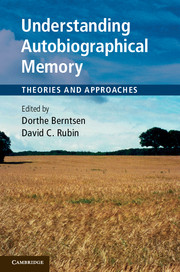Book contents
- Frontmatter
- Contents
- List of figures
- List of tables
- List of contributors
- Preface
- Acknowledgements
- 1 Introduction
- Part I Approaches to the study of autobiographical memory
- Part II Neural studies of autobiographical memory
- Part III Social and cultural aspects of autobiographical memory
- Part IV Development of autobiographical memory from infancy to old age
- Part V Evolution and basic processes of autobiographical memory
- Part VI Discussion
- Index
Part III - Social and cultural aspects of autobiographical memory
Published online by Cambridge University Press: 05 November 2012
- Frontmatter
- Contents
- List of figures
- List of tables
- List of contributors
- Preface
- Acknowledgements
- 1 Introduction
- Part I Approaches to the study of autobiographical memory
- Part II Neural studies of autobiographical memory
- Part III Social and cultural aspects of autobiographical memory
- Part IV Development of autobiographical memory from infancy to old age
- Part V Evolution and basic processes of autobiographical memory
- Part VI Discussion
- Index
Summary
Social and cultural aspects of autobiographical memory
The three chapters in this part all consider how each individual’s memory is embedded in a larger social, cultural, and historical context, and how this affects the organization and content of autobiographical memories as well their retrieval and forgetting. Hirst and colleagues discuss the notion of collective remembering and reviews studies showing how the social context affects retrieval and forgetting of autobiographical memories. Their chapter describes the relevance of the experimental paradigm of retrieval-induced forgetting for our understanding of autobiographical remembering within a social context. The chapter by Brown and colleagues examines the effects of transitons on the organization of autobiographical memories. They argue that events that “change the fabric of everyday life” will have lasting effects on memory organization by defining new time periods in the individual life course. Such transitions can be both historical events affecting an entire community (e.g., end of World War II) and more private events (e.g., getting married), which may be culturally normative. Pillemer and Kuwabara discuss the directive functions of autobiographical remembering – that is, how autobiographical memories may help us to arrive at a better understanding of a given problem and also how our memories help to set the course for our behavior and goals in complex social situations. By discussing such functional aspects of remembering, Pillemer and Kuwabara address how autobiographical memories become adaptive in a larger social and cultural context.
- Type
- Chapter
- Information
- Understanding Autobiographical MemoryTheories and Approaches, pp. 139 - 140Publisher: Cambridge University PressPrint publication year: 2012



